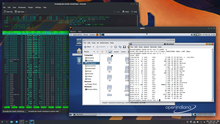 | |
 The free operating system OpenIndiana running within QEMU, which runs as a process on Linux | |
| Original author(s) | Fabrice Bellard |
|---|---|
| Developer(s) | QEMU team: Peter Maydell, et al. |
| Stable release | 9.1.2[1] |
| Repository | |
| Written in | C |
| Operating system | Linux, Microsoft Windows, macOS and some other UNIX platforms |
| Type | Hypervisor, Emulator |
| License | GPL-2.0-only[2] |
| Website | www |
QEMU (Quick Emulator)[3] is a free and open-source emulator that uses dynamic binary translation to emulate the processor of a computer. It provides a variety of hardware and device models for the machine, enabling it to run different guest operating systems. QEMU can be used in conjunction with Kernel-based Virtual Machine (KVM) to execute virtual machines at near-native speeds. Additionally, QEMU supports the emulation of user-level processes, allowing applications compiled for one processor architecture to run on another.[4]
QEMU supports the emulation of various processor architectures, including x86, ARM, PowerPC, RISC-V, and others.
- ^ "[ANNOUNCE] QEMU 9.1.2 Stable released". 21 November 2024. Retrieved 21 November 2024.
- ^ "License - QEMU".
- ^ "Glossary". National Institute of Standards and Technology. Retrieved 2023-04-24.
- ^ Speed, Richard (2019-04-25). "QEMU 4 arrives with toys for Arm admirers, RISC-V revolutionaries, POWER patriots... you get the idea". www.theregister.co.uk. The Register. Archived from the original on 2019-10-01. Retrieved 2019-10-01.